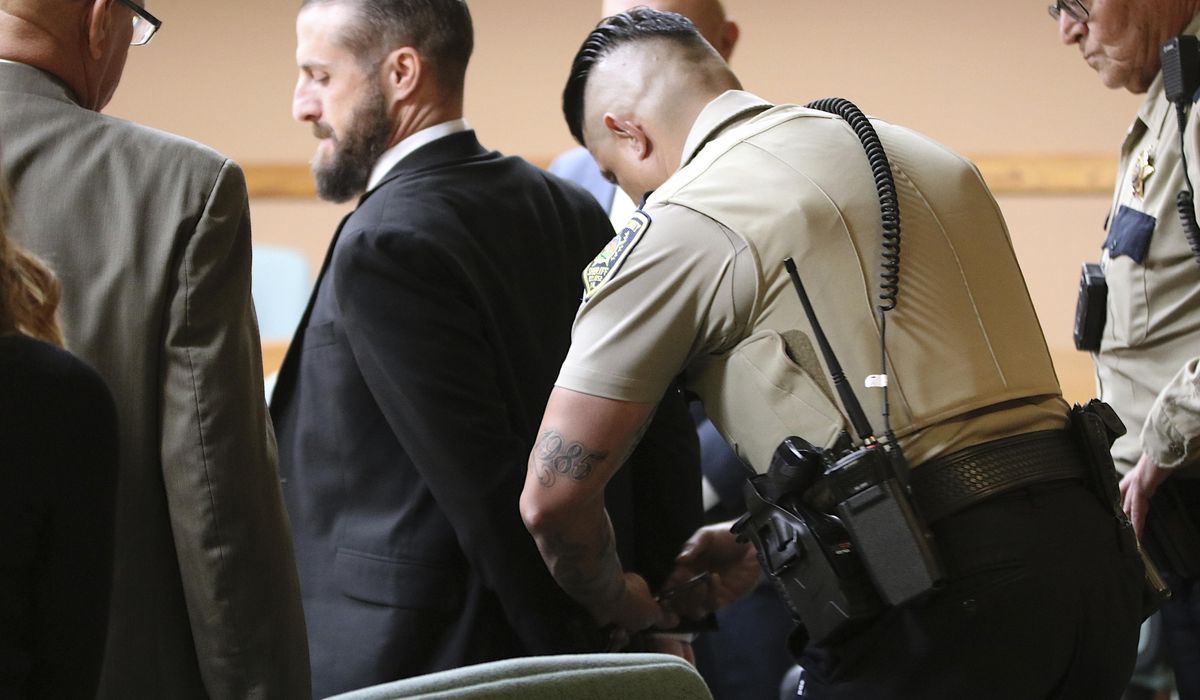


A lawyer for a former New Mexico police officer who was convicted in a deadly 2022 shooting says a biased jury tainted the verdict last month, noting that the jury foreperson failed to share her links to the “defund the police” movement and her writings on “anti-Blackness” in law enforcement.
Attorney Matt Chandler is asking for a new trial for former Las Cruces police officer Brad Lunsford after uncovering the jury foreperson’s ties to anti-police causes, which, he argues, influenced the verdict in the shooting death of a violent theft suspect.
The filing in Dona Ana County Court says the foreperson did not disclose her affiliations to the groups or ideas during the jury selection process — despite pointed questions from the defense team to reveal such connections — and skewed the verdict against Lunsford.
Mr. Chandler’s motion requests that the court set aside the verdict and give Lunsford a new trial based on the influence of the juror’s bias.
“It is difficult to uncover certain concealed biases of a juror, but in this particular case, we believe that there is a long standing history that should have been disclosed,” the attorney told The Washington Times. “This significantly impacted the outcome of the verdict.”
Lunsford was found guilty Feb. 11 of voluntary manslaughter in the 2022 killing of Presley Eze.
Court documents said Lunsford and his partner confronted Eze, 36, after he was accused of shoplifting beer from a gas station in Las Cruces. Eze began struggling with the officers as they tried to arrest him, concussed Lunsford’s partner and grabbed that officer’s Taser during the scrum, according to the documents.
Lunsford shot and killed Eze moments later.
Local prosecutors declined to pursue the case, which was taken up by New Mexico Attorney General Raúl Torrez, a Democrat who has received campaign cash from left-wing billionaire George Soros.
Lunsford now faces up to nine years behind bars if the verdict is upheld. He is currently out on bail.
Mr. Chandler’s motion argues the verdict was tilted by some of the jury foreperson’s affiliations, including her membership with the Kansas City, Missouri, chapter of Standing Up for Racial Justice. The group openly advocates for cutting police funding and closing jails.
The motion also accuses the foreperson of writing “multiple academic works regarding race, policing and ‘anti-Blackness’ to include a 441-page dissertation.”
Further, the filing says the foreperson appeared on a podcast in which she discussed “racial justice in America and police use of force.”
The foreperson mentioned in the same podcast that her daughter created a “zine” about police brutality and drew pictures of White police officers shooting a Black person, according to Mr. Chandler’s motion.
Mr. Chandler said he didn’t want to speculate on how a judge will rule on his motion for a new trial.
“We just believe that Brad should have a fair and impartial trial,” the attorney said. “Just like every other citizen is afforded the same right.”
The attorney, who was brought on to review the trial for errors after Lunsford’s conviction, did not identify the juror by name or say how he gathered the information on her possible bias.
Mr. Torrez, the state attorney general, slammed the motion as a “partisan witch-hunt” that was drummed up after the prior defense team “failed to do their job during jury selection.”
“The defense’s accusations of bias based on a juror’s political beliefs is contrary to the law and to the impartial administration of justice,” Mr. Torrez said in a statement. “Jurors are entrusted to decide cases based on evidence — not to be subjected to public humiliation and personal attacks for an unpopular verdict.”
The jury bias allegations are the second motion put forward by Lunsford’s legal team in an effort to avoid a conviction. The other are accusations of potential jury misconduct allowed by the court.
During the eight-day trial, two jurors were dismissed in favor of alternates, despite Mr. Chandler saying that neither of the dismissed jurors had any scheduling conflicts or qualification issues that warranted their removal.
The defense attorney said one of the dismissed jurors told local media afterward that she was convinced Lunsford did not commit a crime during his 2022 encounter with Eze. The new jury took less than three hours of deliberations before convicting Lunsford.
Mr. Chandler argued that the jury swap-out violated New Mexico law and Lunsford’s rights under the Constitution.
“Our position is, anytime there’s a violation of a constitutional right, it’s presumed prejudice,” he said.
Judge James Foy admitted last week to committing errors in how the jurors were managed by the court.
The next hearing in the case is scheduled for Friday. Judge Foy is expected to deliver a ruling April 4 on whether the defense team’s motions affected the outcome of the trial.
• Matt Delaney can be reached at mdelaney@washingtontimes.com.
